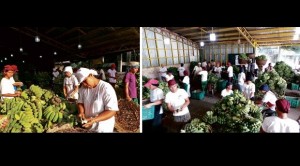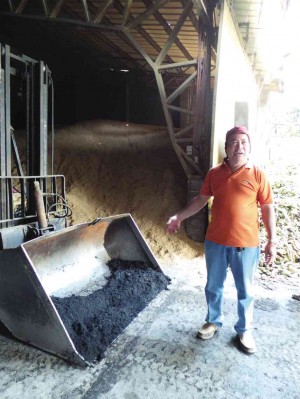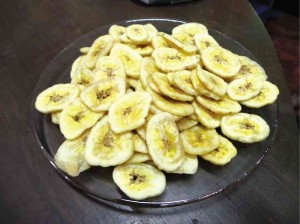Engineering grad makes bananas his business

THEY have hired banana peelers, all 80 or more, who peel Cardaba bananas to the tune of about 40,000 kilos a day with each basket or “kaing” being weighed at about 40 kilos.
As soon as you enter their warehouse, a pungent smell( of what I later learned was the odor of rubber cuplumps) engulfs the air around you, but they joke that this is the smell of “money.”
We go around the warehouse amongst cement bags, round bars and other construction materials. How can this cooperative be in the business of bananas?
We later are told the story of their 25-year existence by no other than the general manager, entrepreneur Emmanuel “Bobot” Zamoras (yes, plural of Zamora), now 52 years old and surviving founder Jesus “Jess” O. Kionisala, now 77 years old, a survivor of a mild stroke but still helps Bobot manage the cooperative.

THE cooperative does vertical integration. They buy palay husks to use as fuel in frying their banana chips.
Magirco (Magpet Agro Industrial Resources Cooperative) was founded by Emmanuel’s father Eufronio D. Zamoras, and Jesus Kionisala in 1989 but would have no activity until 1993 when the elder Zamoras offered his own property for mortgage so they could borrow from PNB during that time. Since then, Magirco has built an asset base of almost P100 million, from zero almost 25 years ago. It now has over 300 members and has employed hundreds of people in the Magpet, Cotabato environs.
Bobot Zamoras showed us a “moviemaker” homemade audio visual presentation of how the coop has grown and how many vehicles they now own. The measure of success has been measured humbly in how many trucks they now have which number 16, articulated and repurposed forklift/payloaders and even a brand new SUV for the general manager (because he always has to be in a reliable vehicle as he does long drives to and from Davao to Magpet).
The interesting quality of this cooperative is the vertical integration they have done in their business. They buy palay husks to use as fuel in frying their banana chips. The carbonized rice hull which is a waste product after burning the husks become organic fertilizers that they give away free to farmers and members. That is just one of their recycling activities.
They have hired banana peelers, all 80 or more, who peel Cardaba bananas to the tune of about 40,000 kilos a day with each basket or “kaing” being weighed at about 40 kilos. The staff weigh each basket, record its source and turn them over to peelers. Each peeler can peel 100 to 400 kilos of bananas a day. Unimaginable but they do it at a fast pace as they are paid for speed and quality of work. A peeler can take home as little as P100/day or as much as P600/day as there is an incentive for faster pace. But hear this, they get three square meals while on duty, too! Now, is that not a better choice for those wanting city jobs?
The next process involves frying the bananas in coconut oil which comes from copra that they bought from farmers, brought to a mill to convert to coconut oil for frying and copra pellets for selling. It is amazing, and I joked Zamoras that I would nominate him for the Entrepreneur of the Year award.
The banana peel is about 60 percent of the weight of the banana, and these 24,000 kilos/day of peel should be brought somewhere, correct? They are hauled by Magirco’s trucks to be brought back to farmers again and given for free, as organic fertilizer. What a nice supply arrangement. They take the banana, take the fruit, and return the peel to the soil. Natural and organic.
The banana chips are then sold to exporters who buy the “first fry” in bulk, assuring Magirco of a steady income. But more than this regular income, and like a true blue entrepreneur Zamoras has found other incomes in buying and selling construction materials, trading rubber, copra and other high-value products. “The secret is in having a steady source of funds,” he claims. “Cash flow is critical,” he continues,” because we always need cash to buy from farmers who may not even be our members,” he says. He is thankful that they now have credit lines with Landbank, PNB and also from Peace and Equity Foundation.
Zamoras is a Mechanical Engineering graduate who learned the business side from his entrepreneur father. He started working at Magirco from its beginnings and truly calls it his only job and his only passion. He is able to use his engineering background and acumen to repurpose equipment such as a forklift that he converted to become a payloader for the banana peels and the carbonized rice hull.
He also designed a conveyor system for the palay husks that transport the fuel to the furnace used for frying the banana chips. He used the half bottoms of his “jerrycans” used for cooking oil, as the feeder containers for the conveyor. Ingenious.
A mechanical engineer-businessman-entrepreneur all rolled into one is what you would conclude Zamoras to be. But more than that, he has a big heart as well. Magirco, under his leadership, does regular blood letting in memory of the older Zamoras, they donate school supplies to grade school children in their community and they even go tree planting, using guyabano seedlings. Philanthropy and CSR start from the top, and Zamoras surely has influenced his co-members and his staff to give and pay forward.
Now, this should be a good example of a cooperative, run like a professional business, and truly sustainable.

